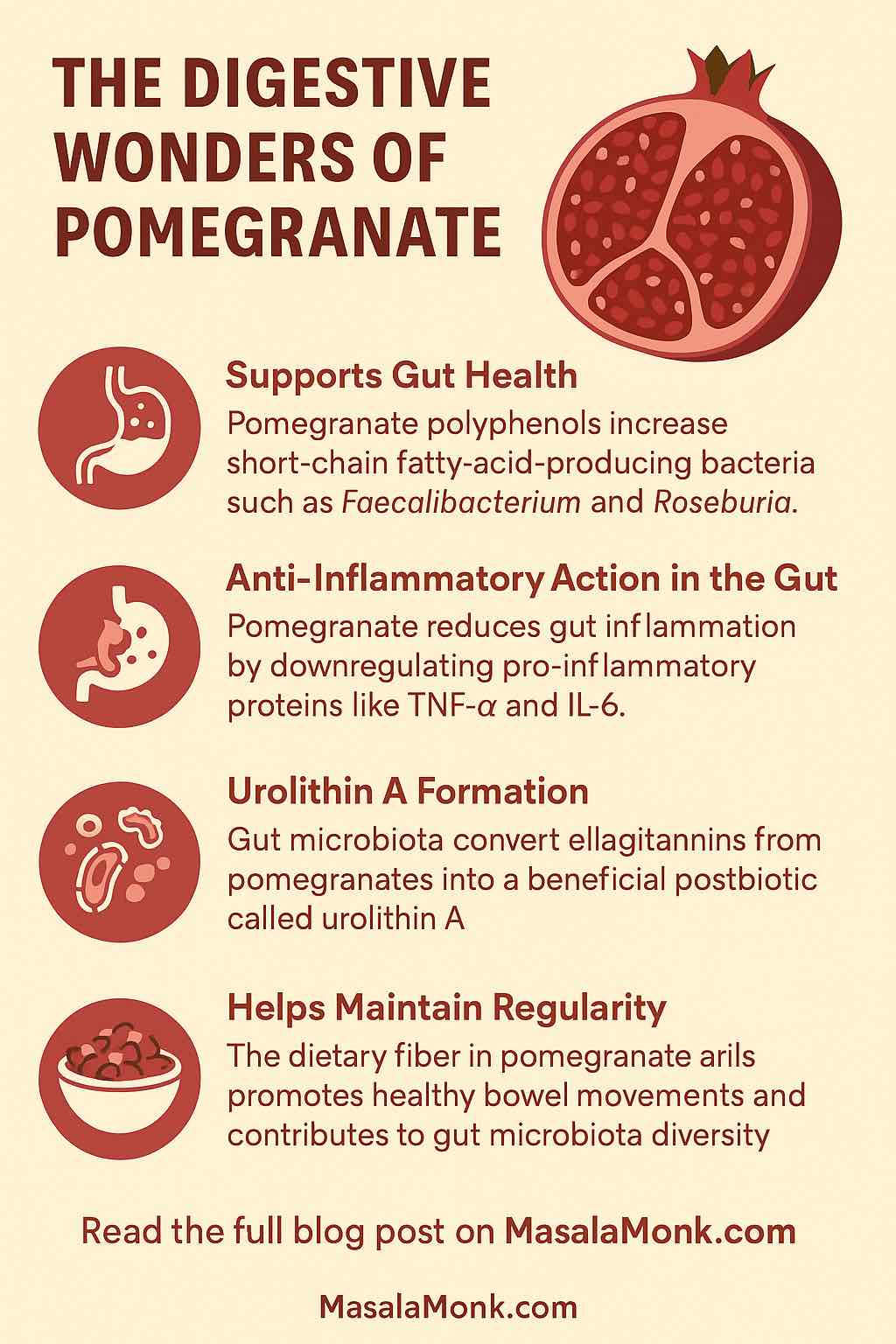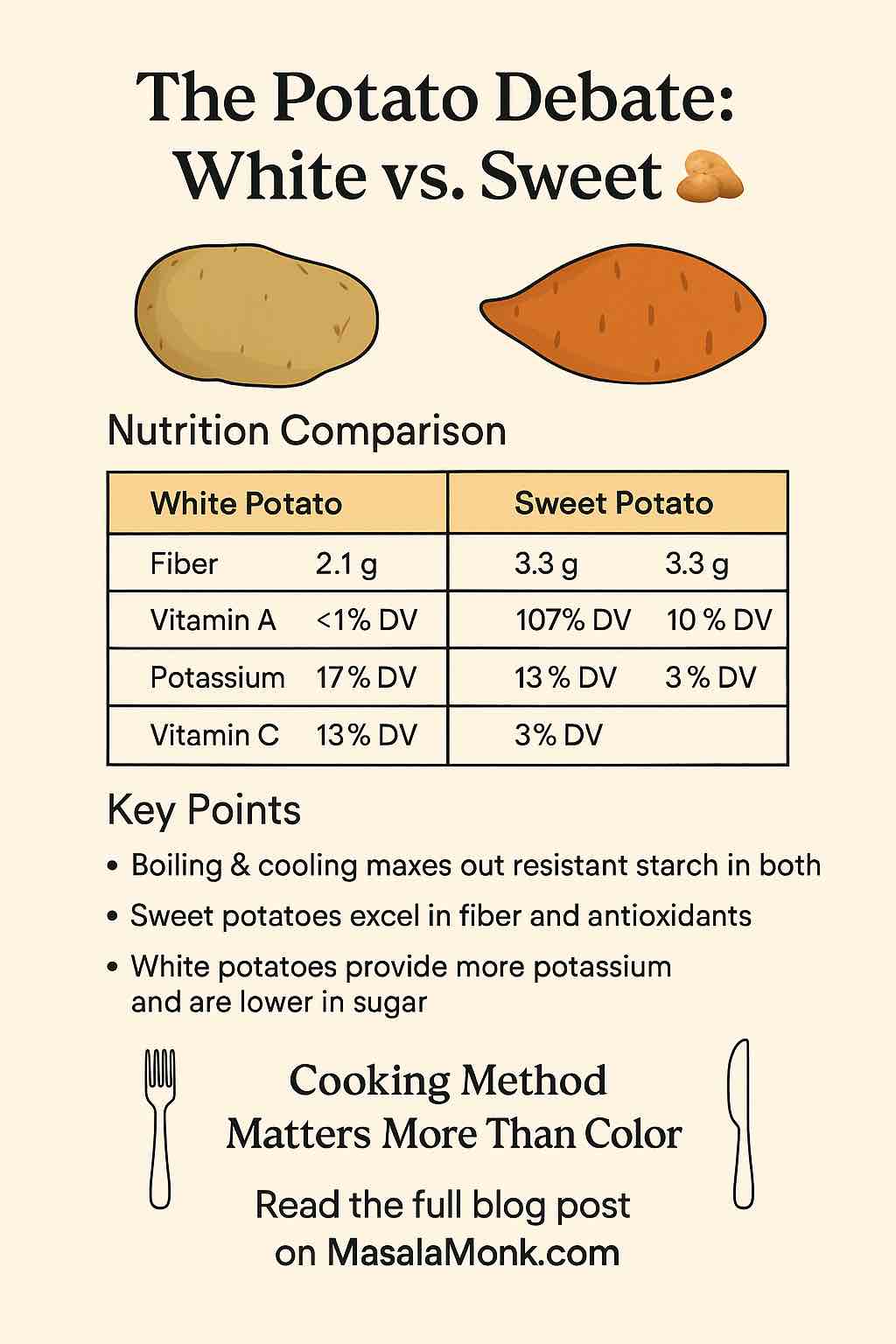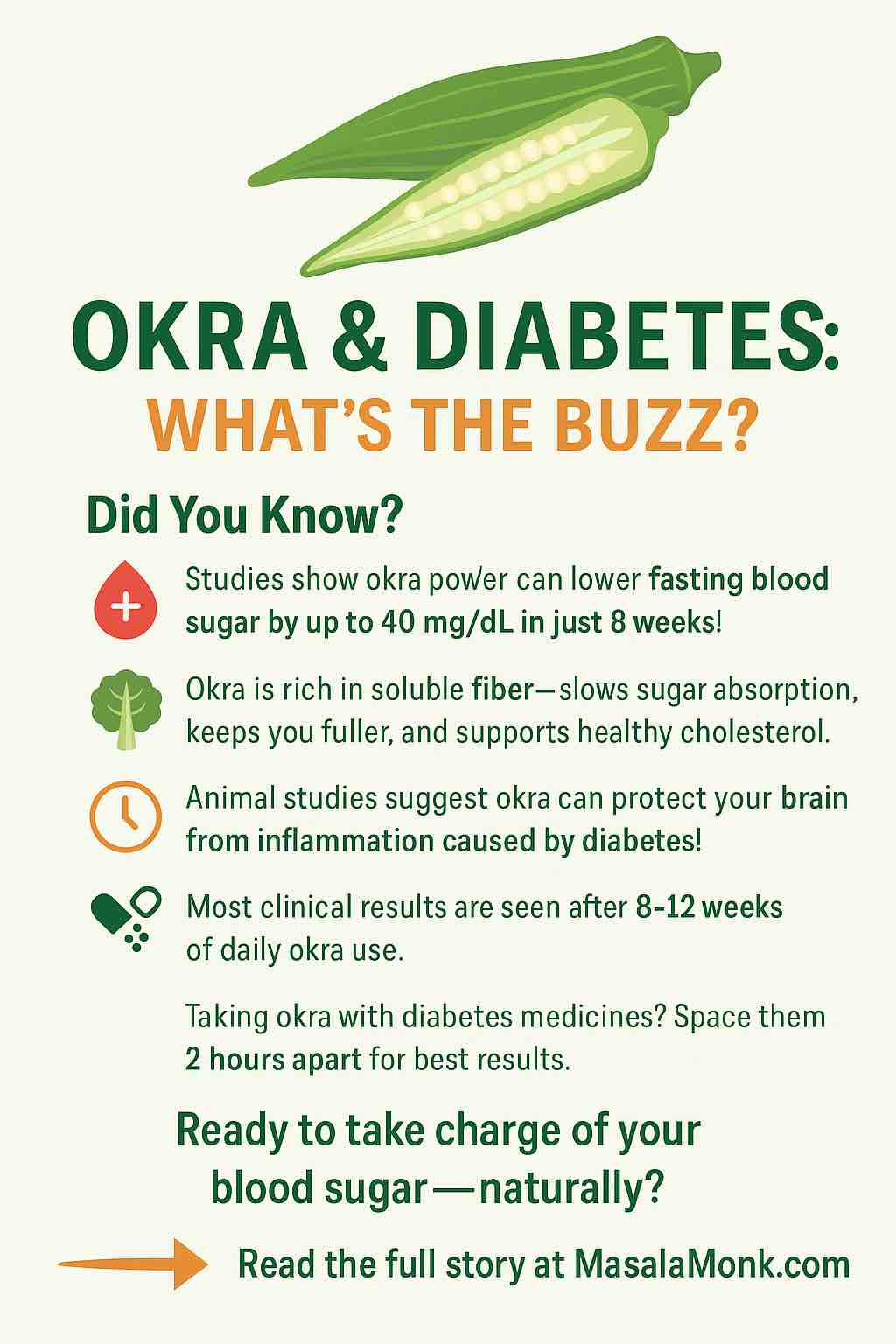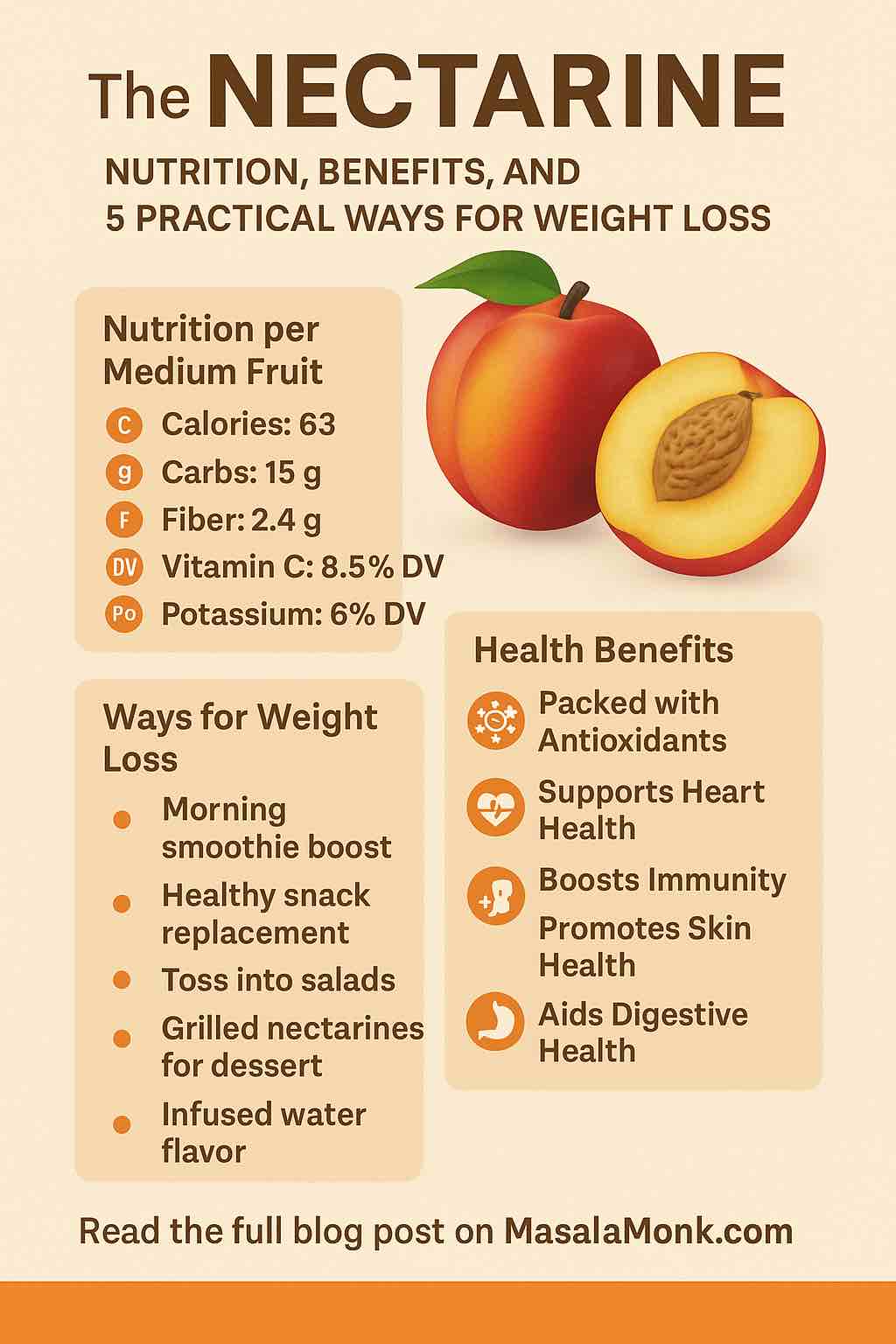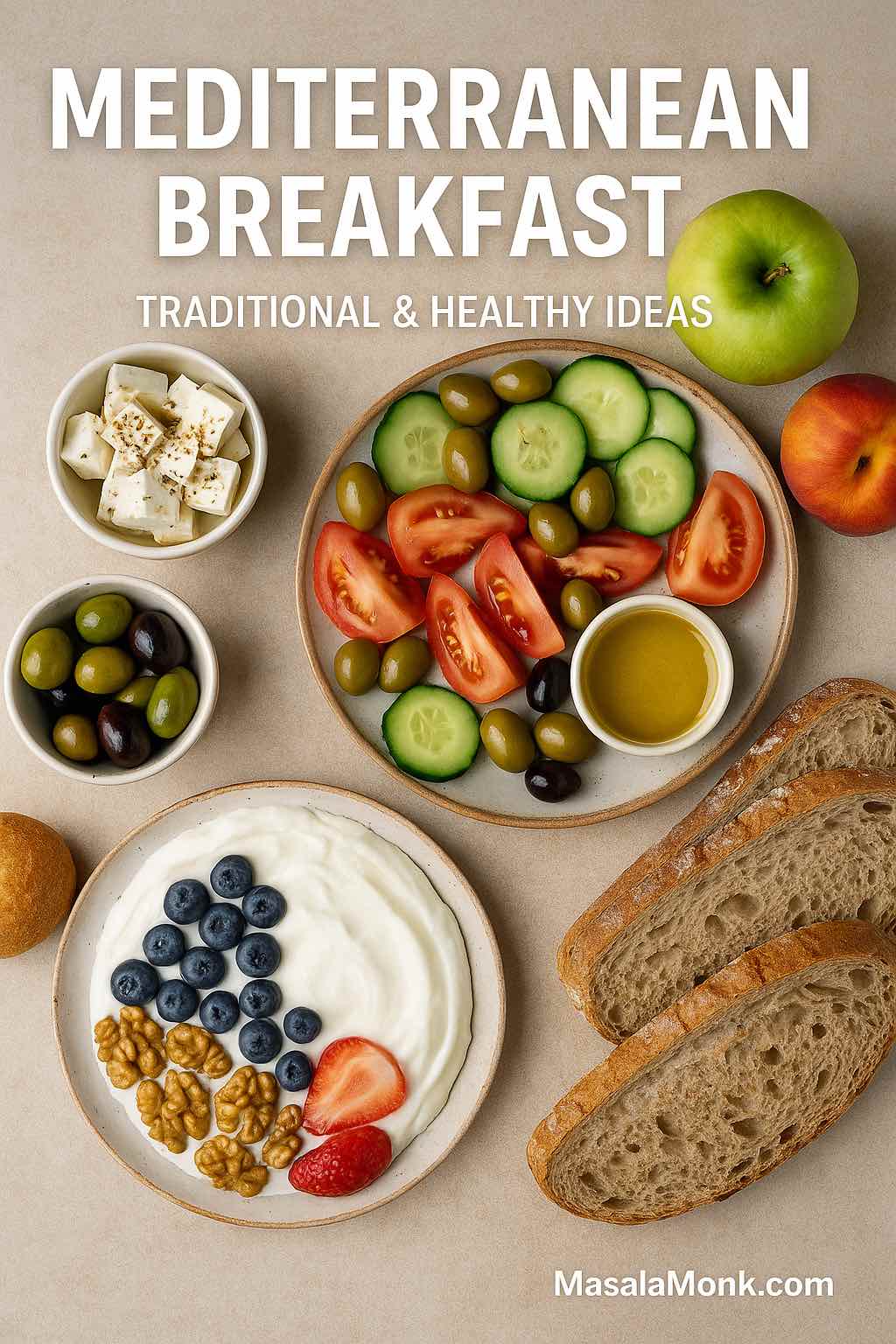
If you’ve ever wondered “What do Mediterraneans really eat for breakfast?” you’re not alone. A Mediterranean breakfast isn’t just food on a plate—it’s a ritual, a slower start to the day, and a celebration of simple, nourishing ingredients. Think ripe fruit, creamy yogurt, a drizzle of golden olive oil, and just enough bread to soak it all up.
The beauty of this style of eating is its balance. Some mornings are as light as a Greek yogurt bowl with honey and nuts, while others are heartier, like shakshuka simmering away in a pan. Whether your goal is to enjoy a traditional spread, follow the Mediterranean diet for better health, or pick up a few quick breakfast ideas for busy mornings, you’ll find inspiration here.
The Mediterranean diet isn’t just delicious—it’s also one of the most studied and recommended eating patterns in the world. Research shows it helps lower the risk of heart disease, diabetes, and even some cancers, while supporting long-term health and longevity (Mayo Clinic; NCBI Review).
For a deeper dive, check out our own Mediterranean diet guide or download a free Mediterranean diet meal plan.
So, let’s begin by exploring what a typical Mediterranean breakfast looks like across the region—because once you see the variety, you’ll realize there’s no one-size-fits-all.
What is a Typical Mediterranean Breakfast?
When people ask about a “typical” or “traditional” Mediterranean breakfast, the truth is—it depends on where you are. The Mediterranean is a patchwork of cultures and flavors, and breakfast looks a little different in each country. What they all share, though, is a love for fresh, seasonal food and the art of keeping things simple.
Here’s a quick tour:
Greek Breakfast
Mornings in Greece are often slow and satisfying. Imagine a bowl of thick Greek yogurt topped with honey, nuts, and figs, or a slice of fresh bread with cheese, olives, and a drizzle of olive oil. Coffee, of course, is always nearby.
Turkish Breakfast (Kahvaltı)
If you love variety, you’ll fall in love with a Turkish breakfast. It’s not just a meal, it’s a spread—plates of tomatoes, cucumbers, olives, cheeses, and bread fill the table. Eggs might be served boiled or as menemen (scrambled with tomatoes and peppers). Black tea in little tulip-shaped glasses ties it all together.
Italian Breakfast
In Italy, breakfast is more about a quick bite than a feast. A strong espresso or cappuccino, maybe paired with fresh fruit, yogurt, or a slice of wholemeal toast drizzled with olive oil. Simple, light, and elegant—just like the Italian lifestyle.
Spanish Breakfast
Spain leans toward hearty simplicity. The classic pan con tomate—toasted bread rubbed with fresh tomato and olive oil—is often topped with cheese or ham. Add a piece of fruit and a cup of coffee, and you’ve got a perfect Mediterranean morning.
In many Eastern Mediterranean countries, mornings begin with a generous spread of cheese, olives, hummus, and beans like ful medames—a tradition highlighted by Oldways.
👉 As you can see, there isn’t one “correct” Mediterranean breakfast. Instead, it’s a celebration of fresh produce, wholesome grains, and healthy fats—delicious proof that eating well can also feel joyful.
Mediterranean Diet Breakfast Ideas for Every Lifestyle
The Mediterranean diet isn’t a strict set of rules—it’s more of a lifestyle. And that’s exactly why breakfast on this diet can be so flexible. Whether you’re looking for something quick and easy, healthy and balanced, or even a little indulgent, there’s always an option that feels doable.
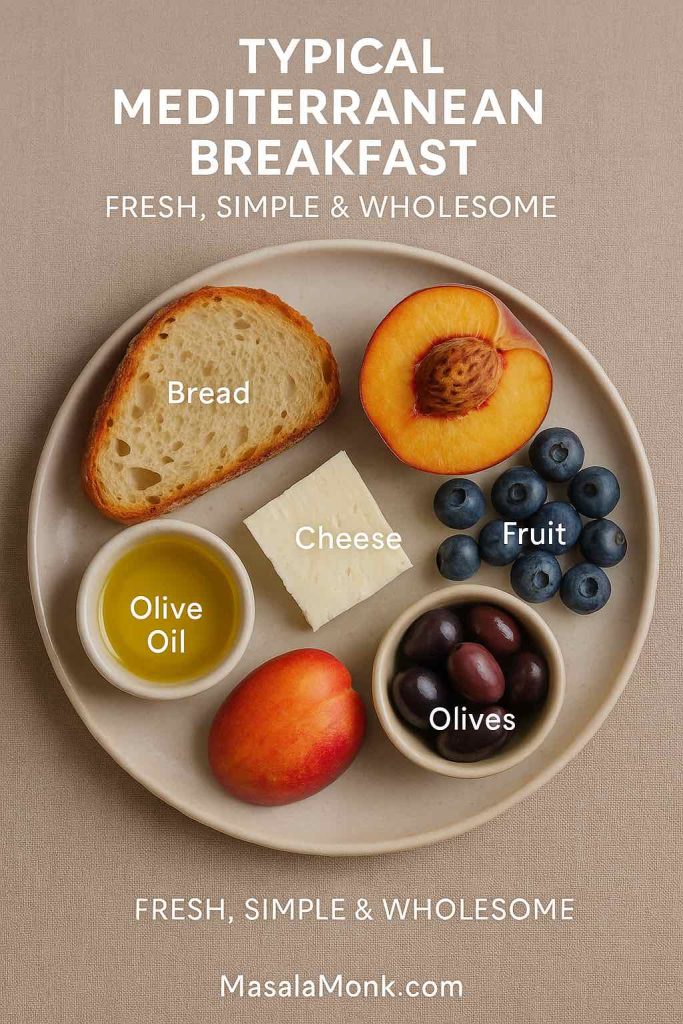
Here are a few ways you can bring the Mediterranean morning to your own kitchen:
Healthy Mediterranean Breakfast Ideas
If you want to start the day feeling energized, focus on whole foods and natural flavors. Some simple but powerful options include:
- Greek yogurt with berries and chia seeds – creamy, tangy, and full of protein.
- Whole-grain toast with hummus and veggies – a savory option packed with fiber.
- Fruit with nuts and a drizzle of olive oil – yes, olive oil on fruit! It adds a silky richness and healthy fats.
These choices are light, refreshing, and perfect if you like to feel fueled but not heavy in the morning.
Easy Mediterranean Diet Breakfast Recipes
Not a morning person? No problem. These quick breakfasts can be ready in minutes—or prepped ahead for grab-and-go ease:
- Overnight oats with figs and walnuts – soak your oats in almond milk overnight, then top with Mediterranean favorites like figs and nuts.
- Mediterranean smoothie – blend spinach, Greek yogurt, banana, and flaxseeds for a fast, nutrient-packed drink.
- Avocado toast with olives and tomato – the ultimate 5-minute breakfast with all the flavors of the Mediterranean coast.
When You Want Something Cozy
Some mornings call for a little extra comfort. On those days, go for:
- Warm oatmeal with honey and pistachios
- A slice of rustic bread with olive oil and za’atar
- A cup of herbal tea or Turkish-style coffee to complete the ritual.
👉 The best part? You can mix and match these ideas all week long. One day might be yogurt and fruit, the next a hearty smoothie, and the next something as simple as bread with olive oil. That’s the beauty of the Mediterranean diet—it’s flexible, joyful, and endlessly adaptable to your lifestyle.
Mediterranean Breakfast Recipes with Eggs
Eggs are a big part of Mediterranean mornings, and for good reason—they’re affordable, versatile, and a fantastic source of protein. In many Mediterranean countries, eggs are combined with fresh vegetables, herbs, and olive oil to create dishes that are both comforting and nourishing.
Here are a few classic recipes you’ll want to try:
Shakshuka
If there’s one Mediterranean egg dish that has gone global, it’s shakshuka. Originating in North Africa and popular across the Middle East, shakshuka features eggs gently poached in a sauce of tomatoes, onions, peppers, and spices. Serve it right out of the skillet with crusty bread to scoop up every last bite—it’s hearty, flavorful, and perfect for brunch or a lazy weekend morning.
Menemen (Turkish Scrambled Eggs)
Menemen is Turkey’s answer to comfort food. It’s made by slowly cooking tomatoes, peppers, and onions until soft, then scrambling in eggs with a drizzle of olive oil. Creamy, slightly sweet, and full of vegetables, it’s a dish that feels indulgent yet light at the same time. Pair it with warm bread and olives for a true Turkish-style breakfast.
Vegetable Omelet with Feta and Herbs
Sometimes, simple is best. A classic Mediterranean omelet often includes fresh vegetables like spinach, zucchini, or peppers, finished with a sprinkle of crumbled feta and fragrant herbs like dill or parsley. It’s quick enough for weekdays but tasty enough to impress guests at brunch.
Looking for more exciting egg options, read our post on 10 Examples of Egg Dishes, with 2 Eggs.
👉 These egg dishes are more than just recipes—they’re traditions, often shared at the table with family or friends. And the beauty of them is how flexible they are: add more veggies if you want a lighter meal, or pair them with whole-grain bread if you need something more filling.
Mediterranean Breakfast Without Eggs
Not everyone is an egg lover—and that’s completely fine. The good news? The Mediterranean diet offers plenty of delicious, satisfying breakfasts without a single egg in sight. These meals are light, nourishing, and just as authentic as their egg-based counterparts.
Here are some of the best ideas:
Greek Yogurt with Nuts and Honey
Creamy, protein-rich Greek yogurt topped with walnuts, almonds, or pistachios and a drizzle of honey is a classic choice. Add fresh fruit like figs, grapes, or berries for natural sweetness. It’s quick, filling, and feels like a little treat.
Oatmeal with Olive Oil and Fruit
Yes, you read that right—olive oil on oatmeal! In the Mediterranean, it’s common to drizzle good extra-virgin olive oil over warm oats, then top with dried figs, dates, or pomegranate seeds. It’s earthy, slightly sweet, and packed with fiber and healthy fats.
Olive oil is more than just a fat—it’s one of the Mediterranean diet’s true superfoods, known for its anti-inflammatory benefits.
Hummus and Veggie Toast
A slice of whole-grain bread spread with creamy hummus and layered with tomatoes, cucumbers, or roasted peppers makes for a savory, egg-free option that keeps you satisfied. Sprinkle a little za’atar or paprika for extra flavor. Here is a simple recipe to help you out: Hummus Veggie Sandwich: A Nutritious and Delicious Delight.
Chia Pudding with Almond Milk
If you’re looking for something you can prep the night before, chia pudding is a perfect fit. Mix chia seeds with almond milk, let it thicken overnight, and top with fruit, nuts, or even a spoonful of tahini in the morning.
Fan of Chia Pudding – explore 10 Creative Chia Pudding Recipes for Every Taste.
For more Egg Free and Vegan variety, here are some more plant-based High Protein breakfast ideas.
👉 As you can see, skipping eggs doesn’t mean missing out. These breakfasts are fresh, wholesome, and incredibly versatile, making them perfect for anyone who prefers plant-based meals or simply wants to switch things up.
Mediterranean Diet Breakfast for Weight Loss
One of the reasons the Mediterranean diet is so popular is because it’s naturally supportive of weight loss. Instead of focusing on restrictions, it encourages balance—lots of fresh vegetables, fruits, whole grains, lean proteins, and of course, heart-healthy fats like olive oil and nuts. The result? Meals that keep you satisfied without feeling heavy.
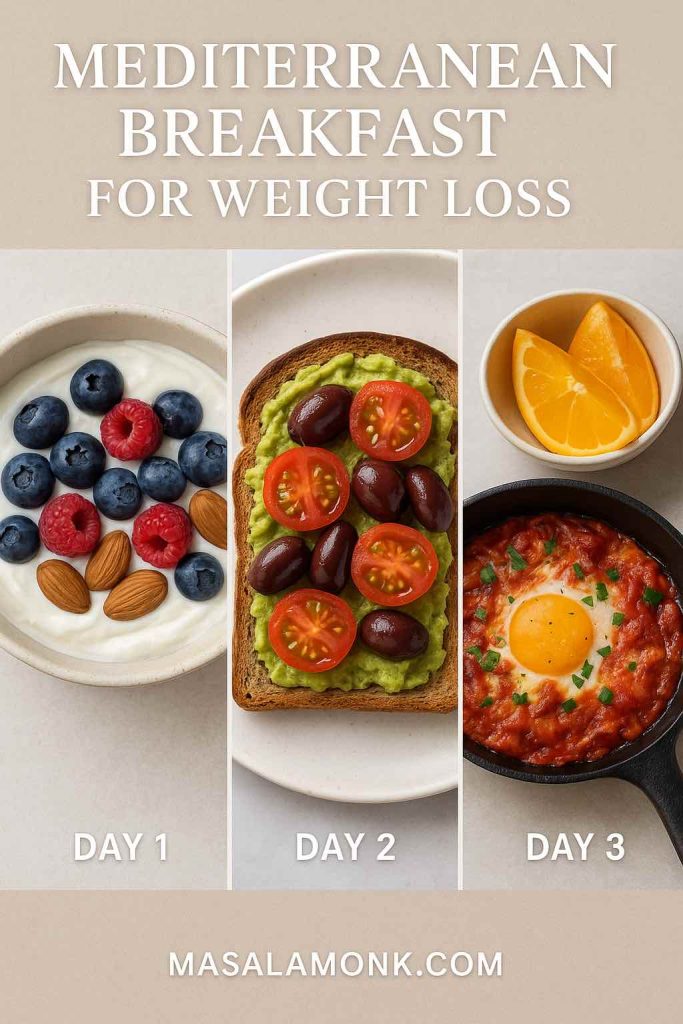
When it comes to breakfast, the trick is to combine protein + healthy fats + fiber so you feel full for hours and avoid mid-morning cravings. Here’s a simple 3-day Mediterranean breakfast plan for weight loss you can try:
First Day – Fresh & Protein-Packed
- Breakfast: Greek yogurt topped with a handful of walnuts, blueberries, and a drizzle of honey.
- Why it works: High in protein and antioxidants, this bowl balances creaminess with crunch while keeping sugar levels stable.
Second Day – Light & Energizing
- Breakfast: Whole-grain toast with smashed avocado, sliced tomatoes, olives, and a sprinkle of feta.
- Why it works: Packed with fiber, healthy fats, and just enough protein to keep you energized until lunch.
Third Day – Hearty & Comforting
- Breakfast: Shakshuka (eggs poached in tomato and pepper sauce) served with a side of fruit.
- Why it works: A filling yet nutrient-dense meal that’s rich in protein and perfect for days when you need extra energy.
Why it helps: Mediterranean-style eating is linked to a healthier gut microbiome, which plays an important role in weight regulation. In a controlled non-human primate study, animals fed a Mediterranean diet self-regulated their intake and avoided overeating compared with those on a Western diet (PubMed: Obesity study; Wake Forest News Release). Adding seasonal produce like tomatoes to support weight-loss makes these meals even more effective.
Bonus for brain health: In a large U.S. cohort (92,383 adults), consuming at least 7 g/day of olive oil (about half a tablespoon) was associated with a 28% lower risk of dementia-related death, independent of overall diet quality (JAMA Network Open; NIA Summary).
👉 These breakfasts aren’t about cutting calories to the extreme—they’re about eating smart, flavorful meals that naturally support weight management. By focusing on whole foods and keeping portions balanced, the Mediterranean diet makes weight loss feel less like a “diet” and more like a lifestyle you’ll actually enjoy.
Mediterranean Breakfast Menu & Meal Prep Ideas
One of the best things about the Mediterranean diet is how easy it is to plan ahead. With just a little prep, you can set yourself up for a whole week of nourishing breakfasts—whether you prefer sweet, savory, quick, or sit-down meals.
Here are some Mediterranean breakfast menu ideas and meal prep tips to make your mornings stress-free:
Weekly Mediterranean Breakfast Menu (Sample)
- Monday – Greek yogurt with figs, almonds, and a drizzle of honey
- Tuesday – Whole-grain toast with hummus, cucumbers, and olive oil
- Wednesday – Vegetable omelet with feta and fresh herbs
- Thursday – Overnight oats with dates, walnuts, and a splash of almond milk
- Friday – Pan con tomate (Spanish tomato toast) with a side of fruit
- Saturday – Shakshuka served with wholemeal bread
- Sunday – Chia pudding with pomegranate seeds and pistachios
Mediterranean Breakfast Meal Prep Tips
- Yogurt jars for the week: Portion Greek yogurt into small containers, then just add toppings in the morning.
- Overnight oats in batches: Prep 3–4 jars at once so you always have a grab-and-go option.
- Shakshuka base ready to go: Cook the tomato-pepper sauce ahead of time, then reheat and crack in eggs when you’re ready to eat.
- Pre-chopped veggies: Keep cucumbers, peppers, and tomatoes washed and ready in the fridge for quick toasts or salads.
- Homemade hummus: Make a batch on Sunday and use it all week for toast, wraps, or veggie dips.
👉 With these ideas, your Mediterranean breakfast isn’t just healthy—it’s also quick, practical, and adaptable. By mixing and matching simple staples like yogurt, bread, eggs, hummus, and fresh produce, you’ll never run out of delicious combinations.
FAQs About Mediterranean Breakfasts
What is a traditional Mediterranean breakfast?
A traditional Mediterranean breakfast often includes simple, fresh foods such as bread with olive oil, cheese, olives, fruit, and yogurt. In some regions, eggs, tomatoes, and herbs are added too. The focus is always on whole, minimally processed ingredients.
What do Mediterraneans eat for breakfast?
It varies by country, but common choices include Greek yogurt with honey and nuts, pan con tomate (Spanish tomato toast), Turkish menemen (eggs with tomatoes and peppers), or just fresh fruit with bread and olive oil.
Can you eat eggs on the Mediterranean diet?
Yes, absolutely. Eggs are a healthy source of protein and are widely used in Mediterranean breakfasts—think omelets with herbs, shakshuka, or simply boiled eggs with olives and bread.
What is a good Mediterranean breakfast for weight loss?
A weight-loss-friendly Mediterranean breakfast combines protein, fiber, and healthy fats. Examples include Greek yogurt with fruit and nuts, avocado toast with vegetables, or oatmeal topped with seeds and olive oil. These keep you full and satisfied without excess calories.
What are examples of Mediterranean breakfasts without eggs?
Great egg-free options include Greek yogurt bowls, hummus and veggie toast, chia pudding with almond milk, or oatmeal with figs and olive oil. They’re just as filling and perfectly aligned with the Mediterranean diet.
Conclusion
A Mediterranean breakfast can be as simple as bread with olive oil or as hearty as shakshuka bubbling away on the stove. What makes it special is the balance of fresh ingredients, healthy fats, and vibrant flavors.
Whether you’re after something traditional, diet-friendly, egg-free, or quick and easy, there’s a Mediterranean breakfast waiting to brighten your morning. So why not bring a little sunshine from the Mediterranean coast to your own kitchen tomorrow? 🌿🍅🥖
If you’d like to dive deeper, the Cleveland Clinic offers an excellent overview of the Mediterranean diet food list and benefits.

